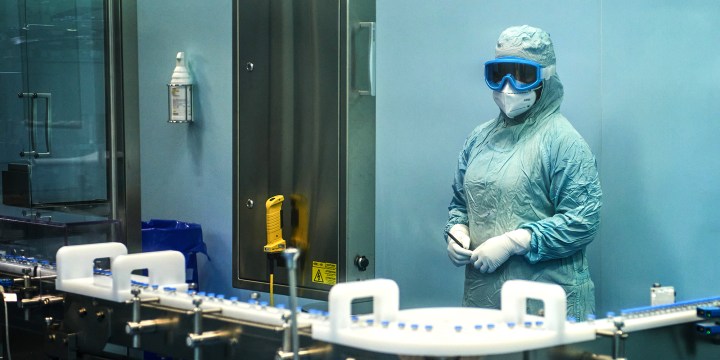COMPANIES
Where to now for Aspen after vaccine facility sits idle?

Shareholders seem to have lost faith in South Africa’s pioneering pharmaceutical company. But perhaps they need to look more closely.
Global vaccine purchasing bodies such as The Vaccine Alliance (Gavi) and the Covid-19 Vaccines Global Access (Covax) have shirked their responsibilities when it comes to supporting African vaccine-manufacturing initiatives, the Bureau of the African Union Heads of State and Government said this month.
The bureau pushed for these bodies to prioritise the procurement of vaccines from African producers. The same message was driven home at a recent meeting between President Cyril Ramaphosa and German Chancellor Olaf Scholz.
Global pressure is mounting on these organisations, as well as on the World Health Organisation and Unicef, to put their money where their mouths are.
“We cannot keep our manufacturing lines vacant indefinitely,” says Stavros Nicolaou, Aspen executive responsible for strategic trade development.
“We need to see incremental progress – we need Gavi and Covax to come out with a strong, explicit statement. They are in an oversupply position, but this is not indefinite.
“The whole world knew we were bringing this capacity on, and we should have been dialled into the supply schedule,” said Nicolaou.
In 2021, Aspen pivoted part of its sterile manufacturing facility to produce Aspenovax under licence from Johnson & Johnson (J&J), and in March 2022 announced the deal had been signed.
Having done so, the company is still sitting with no orders, a fact that CEO Stephen Saad has publicly bemoaned.
“There is a lot of pressure on to solve this,” says Nicolaou. “We cannot afford to lose this capacity. Our disappointment is for Africa.”
Shareholders, too, appear bitterly disappointed.
Inspired by the vaccine opportunity, as well as unsolicited bids for Aspen’s active pharmaceutical ingredient business, they cranked the share up to R270 in October last year. However, frustrated by a lack of action – specifically on the vaccine front – the share has been reduced to current levels of about R156.
Is this sell-off overdone?
This is a company that, in March, reported decent results for the six months to 31 December 2021, with a material improvement in gearing levels and good cash flow generation proving earnings quality.
At the time, Saad gave a brief update on the vaccine efforts, noting that the company had produced about 180 million doses of J&J’s Covid vaccine at its Gqeberha plant in the Eastern Cape – 120 million of them in the six months to 31 December – generating R800-million in vaccine sales to J&J in the period under review.
“This provided the market with some insight into the price of the fill-and-finish contract,” says Steph Erasmus, equity research analyst at Anchor Capital.
But little detail was provided on the potential profitability of Aspenovax, with Saad saying only that it would be in line with international pricing, pegged between $5 and $10 a dose.
Another positive of the results was that management reinstated the dividend in line with prior guidance.
“This proof of execution seemed to reassure investors and the share re-rated, with the focus shifting to growth and upside potential rather than balance sheet concerns,” says Izak van Niekerk, co-portfolio manager at Mergence Investment Managers.
The share may have re-rated, but the business was still trading at a price-to-earnings multiple of 10x.
“The average multiple for a large group of pharma companies is 16x in Europe and 21x in India,” he says. Aspen’s own long-term multiple was about 19x prior to its elevated gearing, which is now resolved.
Since then, the share has de-rated.
“In my view, some investors exited without consideration of the strong fundamentals of the overall business,” says Van Niekerk, who has pencilled in double-digit earnings growth this year, with continued good earnings growth in following years.
The growth, he says, will come from increasing utilisation of Aspen’s sought-after sterile manufacturing capacity.
The company has invested R8.7-billion in this facility over the last four years, as it had planned to bring in-house the manufacturing of its anaesthetics products currently produced by third-party manufacturers.
“Once Aspen ramps up the production of its anaesthetics over the next two years, it could save R800-million in cost of sales after its June 2024 year-end results.
“Furthermore, Aspen may generate an additional circa R1.5-billion in earnings from third-party manufacturing contracts,” adds Erasmus, who agrees with the thesis that Aspen is currently undervalued.
“What the market does not realise is that 70% of Aspen’s sterile manufacturing capacity was never destined for any type of J&J production. J&J production accounts for a small proportion of revenue,” he says.
While capacity will be kept available for the Covid vaccine in the short term, Aspen’s longer term plans are around other solutions for Africa, in particular diabetes, oncology and pain products, says Nicolaou.
“This was a stepping stone. The biggest disappointment is that the continent set itself an objective to reduce vaccine imports from 99% to 40% by 2040.
“But at the end of the day, the decision to pivot away from Covid production must be a business and patient decision – it’s a cardinal sin to have this capacity lying idle.”
This is supported by the global awareness that Aspen has generated over its successful filling and packaging of the J&J vaccines, followed by the subsequent licence to manufacture the vaccine, which has intangible value.
And as global pharmaceutical companies look to relocate some of their manufacturing from the East to the West, Aspen could find itself particularly well placed. DM168
This story first appeared in our weekly Daily Maverick 168 newspaper, which is available countrywide for R25.




















 Become an Insider
Become an Insider
Comments - Please login in order to comment.